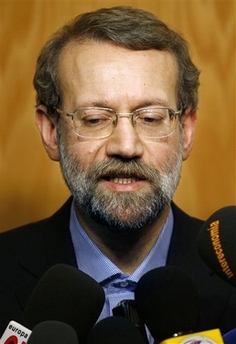Middle East
Diplomats: Iran hinted at suspension
(AP)
Updated: 2007-05-31 10:21
 |
Large Medium Small |
MADRID, Spain - Tehran recently suggested a readiness to discuss a partial suspension of uranium enrichment, but the US and key allies rejected the overture and Iran pulled back from the idea for starting talks on its nuclear program, diplomats said Wednesday
 Senior Iranian envoy Ali Larijani talks to the media after arriving to Madrid Barajas airport, Wednesday, May 30, 2007. [AP]  |
In another sign of defiance, Iranian President Mahmoud Ahmadinejad boasted that his country's military has become so strong that no adversary would risk an attack. "We have passed our point of vulnerability," he told Iranian state television.
Both Iran and the United States reiterated tough positions ahead of the Madrid meeting between Iranian envoy Ali Larijani and EU foreign policy chief Javier Solana.
"Suspension is not the right solution for solving Iran's nuclear issue," the Iranian state news agency quoted envoy Larijani as saying before he flew to Spain.
On arrival in Madrid, he obliquely put the blame for the impasse on the insistence of the US and its allies that Tehran freeze all enrichment, referring to "some mischievous moves by some countries."
Secretary of State Condoleezza Rice, meanwhile, said the world should not soften demands that Iran halt all disputed nuclear work. "That would be a very big mistake," she said.
Rice was responding to questions about increasing sentiment in Europe that the five permanent UN Security Council nations plus Germany - the powers trying to engage Iran - should drop the demand for an enrichment freeze as a condition for talks on an incentive package intended to persuade Iran to rein in its nuclear program.
At their most recent round of talks last month in Turkey, both Larijani and Solana spoke of progress and agreed to meet again to try to bridge the divide.
Iran insists it has the right to develop uranium enrichment to produce fuel for nuclear reactors that would generate electricity, while the Security Council demands it freeze such activities until Tehran allays fears it is trying to develop atomic weapons.
Speaking on condition of anonymity because they were discussing confidential information, diplomats familiar with the issue said at least part of the optimism after the first meeting was based on Iran's apparent readiness to discuss a temporary, but partial suspension of enrichment.
Iran was ready to stop some of its centrifuge machines, which can enrich uranium both to the low level needed for reactor fuel and to high-grade material used for nuclear warheads, one diplomat said.
Insistence by the US and key Security Council allies Britain and France that Tehran fully suspend enrichment doomed chances for agreement, the diplomat said.
"It was clear that those on the Western side did not accept any centrifuges (running) at all," the diplomat said. "As a result, the Iranians have gone completely hard-line."
Diplomats said evidence of that surfaced last Friday in Brussels, Belgium, when Larijani's deputy, Javed Vaidi, met with senior civil servants of Britain, France and Germany who report directly to their foreign ministers. Also present was a senior Solana aide.
"It was a disaster," said one of the diplomats, saying the two sides parted with no signs of progress.
Larijani did leave room for some hope. Before leaving Tehran, he said Iran wanted to allay the West's concerns over its nuclear program. "We want to continue our peaceful nuclear program, but others should have no concerns about it as well," he was quoted as saying.
It was not clear, however, if Larijani's comment signaled that Iran would take concrete steps to alleviate concerns, such as giving more leeway to UN inspectors whose monitoring of Iranian nuclear facilities was curtailed by Tehran after the latest Security Council sanctions.
| 分享按钮 |